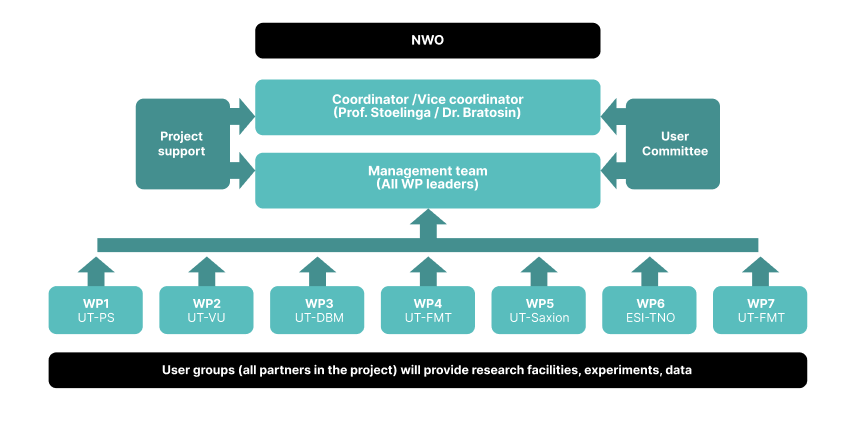Work Packages

WP1: Monitoring systems
WP leader: Dr. Berend Jan van der ZwaagGoal
WP1 will design and develop robust and system level monitoring as an integral part of the CPS, by including: robust monitoring at the levels of hardware, software, and algorithms; systems-of-systems monitoring at component, inter-component, and system levels; meta-monitoring, i.e., monitoring the monitoring system itself; and embedded intelligence enabling inference for diagnostics and shortening the data acquisition/analysis/feedback loop.
WP2: Knowledge representation
WP leaders: Dr. Stefan Schlobach, Dr. Jieying ChenGoal
WP2 will contribute to the re-usability of knowledge, through explicitation and formalization of knowledge. Further, formal knowledge models enable more effective diagnostic processes and therefore reduce the downtime of CPSs.
Members
- Jieying Chen (Vrije Universiteit Amsterdam)
- Georgiana Caltais (Universiteit Twente)
- Ameneh Naghdi Pour (Vrije Universiteit Amsterdam)
- Aimé Ntagengerwa (University of Twente)
- Tom Pelletreau-Duris (Vrije Universiteit Amsterdam) (personal website)
WP3: Diagnostic algorithms
WP leader: Prof. dr. ir. Tiedo TingaGoal
In WP3, we will develop Diagnostic algorithms that work in non-ideal practical settings on the level of a complete CP system, yielding a reduction of system downtime. These diagnostic algorithms will incorporate the organization’s knowledge and guide the selection of sensors that make the diagnostic process more efficient and yield a quickly learning organization.
Members
- Uraz Odyurt (University of Twente)
WP4: Model-based systems engineering
WP leader: Dr. Vadim ZaytsevGoal
WP4 will develop proper metamodels for the domain of intelligent diagnostics, via a (collection of) DSL for diagnostics of cyber-physical systems.
Members
- Dr. Marcus Gerhold (University of Twente)
- Ömer Sayilir (University of Twente)
WP5: Demonstrators
WP leader: Dr. Jeroen LinssenGoal
Key result of WP5 is an integrated demonstrator related to a specific use case, and an extension of standard process models, e.g., for CRISP-DM, with the inclusion of additional phases for demonstrator designs.
Members
- Dr. Faizan Ahmed (University of Twente, Saxion University of Applied Sciences)
- Annemarie Jutte (Saxion University of Applied Sciences)
- Pieter Zeilstra (Saxion University of Applied Sciences)
WP6: Dissemination & technology adoption
WP leader: Dr. Thomas NägeleGoal
WP6 is concerned with creating social and economic value from the project results. Our dissemination activities will spread new knowledge to internal and external stakeholders. We focus on the project website, newsletters, social media posts, videos & podcasts, organization of various workshops, presentations at (inter)national conferences.
Technology adoption is geared at helping parties to implement the project results in their organization. We focus on through the formation of special interest groups, “cookbooks” describing do’s and don’ts intelligent diagnostics in practice, and integration of the results into ESI applied research roadmap.
WP7: Management
WP leader: Prof. Mariëlle StoelingaGoal
WP7: the main responsibilities of WP7 are day-by-day management, strategic and operational decision making, and monitoring the progress of all WPs.
Members
- Dr. Janet Xue (University of Twente)
